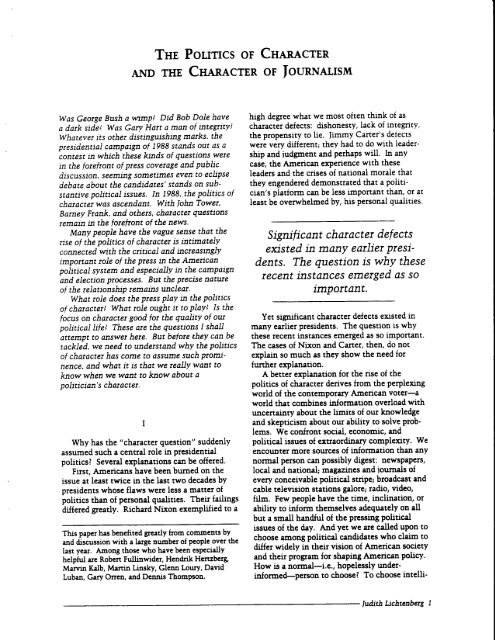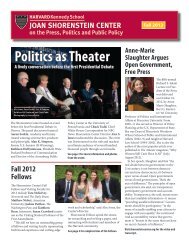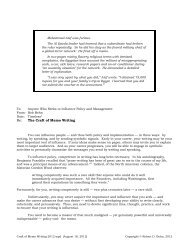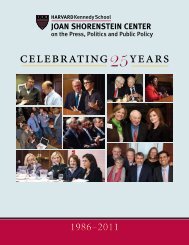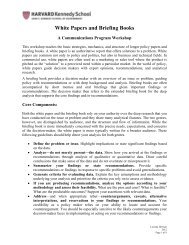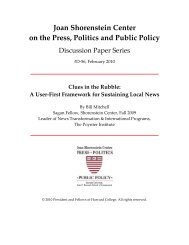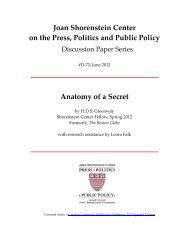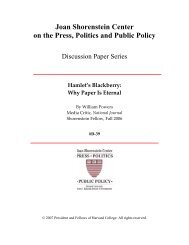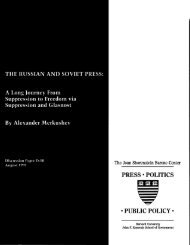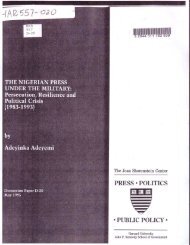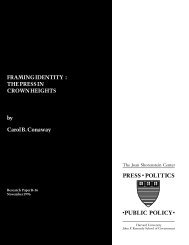PUBLIC POLICY - Joan Shorenstein Center on the Press, Politics ...
PUBLIC POLICY - Joan Shorenstein Center on the Press, Politics ...
PUBLIC POLICY - Joan Shorenstein Center on the Press, Politics ...
Create successful ePaper yourself
Turn your PDF publications into a flip-book with our unique Google optimized e-Paper software.
THr Pourrcs oF Cnenecmn<br />
AND THE crnnecrER oF |ounNnusm<br />
Was George Bush a wimp! Did Bob Dole have<br />
a dark side! Was Gary Hart a man of integttty!<br />
Whatever its o<strong>the</strong>r disti4urshrn g marks, <strong>the</strong><br />
presidential campaign of 1988 stands out as a<br />
c<strong>on</strong>test in which <strong>the</strong>se kinds of questi<strong>on</strong>s were<br />
in <strong>the</strong> forefr<strong>on</strong>t of press covetage and public<br />
discussi<strong>on</strong>, seeming somettmes even to eclipse<br />
debate about <strong>the</strong> candidates' stands <strong>on</strong> substantive<br />
poktical issues. In 1988, <strong>the</strong> pobtics of<br />
character was ascendant. With lohrt Tower,<br />
Barney Frank, and o<strong>the</strong>rs, character questi<strong>on</strong>s<br />
remain in <strong>the</strong> forcfr<strong>on</strong>t of <strong>the</strong> news.<br />
Many people have <strong>the</strong> vagte sense that <strong>the</strong><br />
dse of <strong>the</strong> politics of character is intimately<br />
c<strong>on</strong>nected with <strong>the</strong> cfitical and inueasingly<br />
important role of <strong>the</strong> press in <strong>the</strong> American<br />
political system and especially in <strong>the</strong> campargn<br />
and electi<strong>on</strong> processes. But <strong>the</strong> ptecise natltre<br />
of <strong>the</strong> relati<strong>on</strong>sfup rcmains unclear.<br />
What rcIe does <strong>the</strong> press play in <strong>the</strong> politics<br />
of character! What role ought it to play! Is <strong>the</strong><br />
focus <strong>on</strong> character good for <strong>the</strong> qtdity of ow<br />
political lifel These are <strong>the</strong> questi<strong>on</strong>s I shall<br />
attempt to answer here. But befote <strong>the</strong>y can be<br />
tackled, we need to understand why <strong>the</strong> politics<br />
of character has come to assume such ptominence,<br />
and what jt is that we really want to<br />
know when we want to know about a<br />
p olitic ian' s ch aru cter.<br />
I<br />
Why has <strong>the</strong> "character questi<strong>on</strong>" suddenly<br />
assumed such a centrd role in presidential<br />
politicsl Several explanati<strong>on</strong>s can be offered.<br />
First, Americans have been burned <strong>on</strong> <strong>the</strong><br />
issue at least twice in <strong>the</strong> last two decades by<br />
presidents whose flaws were less a matter of<br />
politics than of pers<strong>on</strong>d qualities. Their failings<br />
dilfered geetly. Richard Nix<strong>on</strong> exemplified to a<br />
This paper has benefited Eready hom comnents by<br />
and discussi<strong>on</strong> with a large number of people over tbe<br />
last year. Am<strong>on</strong>g those who have been especidly<br />
helpful are Robert Frrllinwider, Hendrik Henzberg,<br />
Man'in Kdb, Mertin Linsky, Glenn Loury, David<br />
Luban, Gary Orren, and Dennis Thomps<strong>on</strong>.<br />
high degree what we most often thrnk of as<br />
character defects: dish<strong>on</strong>esty, lack of integnty,<br />
<strong>the</strong> propensity to lie. Iimmy Caner's defects<br />
were very different; <strong>the</strong>y had to do with leadership<br />
and iudgrnent and perhaps wiil. tn any<br />
case, <strong>the</strong> American e:rperience with <strong>the</strong>se<br />
leaders and <strong>the</strong> cnses of nati<strong>on</strong>al morale that<br />
<strong>the</strong>y engendered dem<strong>on</strong>strated that a politi'<br />
cian's platform can be less important than, or at<br />
least be overwhelmed by, his pers<strong>on</strong>al qualitres.<br />
Significant charucter def ects<br />
existed in many eailier Wesi'<br />
dents. The questi<strong>on</strong> is why <strong>the</strong>se<br />
recent instances emerged as so<br />
important.<br />
Yet significant character defects exrsted in<br />
many earlier presidents. The questi<strong>on</strong> is why<br />
<strong>the</strong>se recent instances emerged as so important.<br />
The cases of Nix<strong>on</strong> and Caner, <strong>the</strong>n, do not<br />
explain so much as <strong>the</strong>y show <strong>the</strong> need for<br />
funher e:rplanati<strong>on</strong>.<br />
A better e:cplanati<strong>on</strong> for <strong>the</strong> nse of <strong>the</strong><br />
politics of character derives from <strong>the</strong> perplexing<br />
world of <strong>the</strong> c<strong>on</strong>temporary American votet-e<br />
world that combines inlormati<strong>on</strong> overload with<br />
unggftainty about <strong>the</strong> limits of our knowledge<br />
and skepticism about our ability to solve prob'<br />
lems. We c<strong>on</strong>fr<strong>on</strong>t social, ec<strong>on</strong>omic, and<br />
politicd issues of extraordinary complexrty. We<br />
encounter more sources of informati<strong>on</strong> than any<br />
normal pers<strong>on</strong> can possibly digest: newspapers,<br />
locai and nati<strong>on</strong>d; magazrnes and ioumals of<br />
every c<strong>on</strong>ceivable political stripe, broadcast and<br />
cable televisi<strong>on</strong> stati<strong>on</strong>s galore; radio, video,<br />
film. Few people have <strong>the</strong> time, inclinati<strong>on</strong>, or<br />
ability to inJorrn <strong>the</strong>mselves adequately <strong>on</strong> all<br />
but a smdl handful of <strong>the</strong> pressing political<br />
issues of <strong>the</strong> day. And yet we are cdled up<strong>on</strong> to<br />
choose am<strong>on</strong>g politicd candidates who claim to<br />
differ widely in <strong>the</strong>ir visi<strong>on</strong> of Anerican society<br />
and <strong>the</strong>ir protram for shaping American policy'<br />
How is a normd-i.e., hopelessly undet'<br />
informed-pers<strong>on</strong> to choose? To choose intelli-<br />
ludith lichtenberg 1


